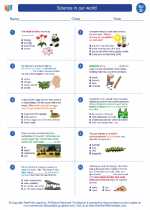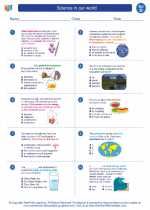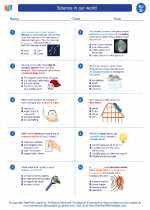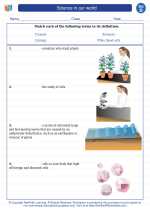Neuroscience
Neuroscience is the scientific study of the nervous system, including the brain, spinal cord, and networks of sensory and motor neurons. It encompasses a wide range of disciplines including neurobiology, psychology, and pharmacology, and seeks to understand the structure and function of the nervous system at various levels, from molecular and cellular to behavioral and cognitive.
Key Concepts in Neuroscience
- Neurons: These are the basic building blocks of the nervous system. They transmit information through electrical and chemical signals.
- Brain Structure: The brain is composed of different regions, each responsible for specific functions such as motor control, sensory processing, and higher cognitive processes.
- Neurotransmitters: These are chemical messengers that transmit signals between neurons, influencing various functions including mood, memory, and behavior.
- Neuroplasticity: The brain's ability to reorganize itself by forming new neural connections throughout life, in response to learning, experience, or injury.
- Brain Disorders: Understanding the nervous system is crucial in addressing and treating neurological disorders such as Alzheimer's disease, Parkinson's disease, and mental health conditions.
Study Guide
Here are some tips for studying neuroscience:
- Start with the basics: Understand the structure and function of neurons, the nervous system, and the brain.
- Explore different levels of analysis: Study neuroscience at the molecular, cellular, systems, and behavioral levels to gain a comprehensive understanding.
- Use visual aids: Diagrams, charts, and models can help you visualize complex neural networks and processes.
- Stay updated: Neuroscience is a rapidly evolving field, so stay informed about the latest research and discoveries.
- Apply knowledge: Relate neuroscience concepts to real-life examples and practical applications, such as understanding brain injuries or neurological diseases.
By mastering the fundamentals of neuroscience, you can gain insights into the complexities of the human brain and its impact on behavior, cognition, and overall health.
.◂Science Worksheets and Study Guides Fourth Grade. Science in our world
Study Guide Science in our world - 4th gr.
Science in our world - 4th gr.  Worksheet/Answer key
Worksheet/Answer key Science in our world - 4th gr.
Science in our world - 4th gr.  Worksheet/Answer key
Worksheet/Answer key Science in our world - 4th gr.
Science in our world - 4th gr.  Worksheet/Answer key
Worksheet/Answer key Science in our world - 4th gr.
Science in our world - 4th gr.  Vocabulary/Answer key
Vocabulary/Answer key Science in our world - 4th gr.
Science in our world - 4th gr. 

 Worksheet/Answer key
Worksheet/Answer key
 Worksheet/Answer key
Worksheet/Answer key
 Worksheet/Answer key
Worksheet/Answer key
 Vocabulary/Answer key
Vocabulary/Answer key

The resources above cover the following skills:
History and Nature of Science: A student should understand the history and nature of science. A student who meets the content standard should:
Develop an understanding that historical perspectives of scientific explanations demonstrate that scientific knowledge changes over time, building on prior knowledge.
Develop an understanding that scientific knowledge is ongoing and subject to change as new evidence becomes available through experimental and/or observational confirmation(s).